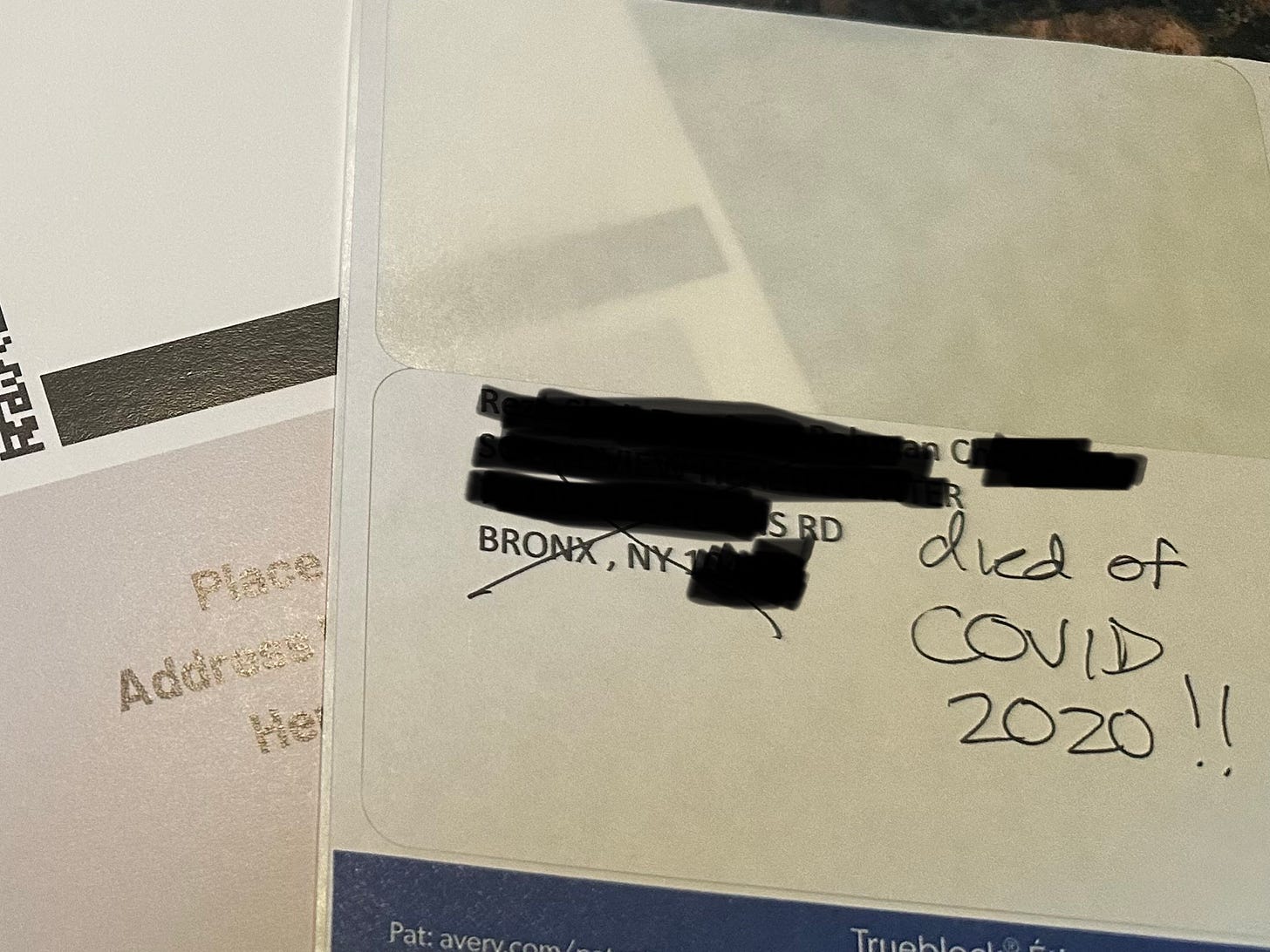Heads up: this is a somber post compared to my last one. I wasn’t planning to go this dark so soon into the life of my newsletter, but I think you’ll understand why in a few minutes.
For over three years, I have been navigating this land mine that is Long COVID and ME/CFS: getting sick ➡️ working full-time ➡️ taking a leave ➡️returning to work part-time ➡️ going back to full-time ➡️ back down to part-time ➡️ and finally on to my second leave, which turned out to be permanent. During this time, I have grappled with finding the balance of doing vs. being (the essence of pacing; see my last post), I have also searched for the emotional rewards that come with making some kind of impact on the world outside of these walls.
In addition to raising awareness about Long COVID on social media and through a handful of media interviews, I have volunteered to assist with small, manageable projects through an organization called #MEAction, an international organization that works to advance recognition, education, and research about ME/CFS and now, Long COVID.
The project I have been assisting with sporadically over the last several months has involved populating an Excel spreadsheet with the names and addresses of medical providers in my region. #MEAction would then create labels for a postcard mailer they were doing to promote a free continuing medical education (CME) course on ME/CFS and Long COVID.
Given that most medical schools do not cover ME/CFS or post-viral illnesses at all, the importance of this education cannot be understated. For decades, doctors who were never educated about ME/CFS – an illness that disproportionately affects women – have so often dismissed patients’ complaints, chalking their symptoms up to anxiety, depression, or the exhaustion that comes with the busyness of everyday life (for two good reads on this very subject, check out The Invisible Kingdom: Reimagining Chronic Illness by Meghan O’Rourke and The Lady’s Handbook for Her Mysterious Illness: A Memoir by Sarah Ramey.) ME/CFS patients, most of whom had gotten sick in isolation from one another and who have had to suffer for decades without enough research studies or any real treatments, were left waiting for a global viral pandemic like COVID-19 to gain any kind of traction.
Since Long COVID is a post-viral illness, and approximately 50% of COVID long haulers also develop ME/CFS, it has made tremendous sense for the advocacy groups working on these illnesses to join forces. Long COVID has been grabbing the medical world’s attention more and more these days, giving doctors and other providers an opportunity to also learn about a long-disregarded illness that’s been around since before some of them were born.
Back to the volunteer project
The #MEAction employee (we’ll call her Michelle) who was coordinating this effort also asked the volunteers if we wouldn’t mind helping out further by including a personal note on some of the postcards and mailing them out to some of the doctors on the list. At first, given my limited energy, I only agreed to do this for the ten or so doctors from whom I had received care. More recently, Michelle asked again if anyone had the energy or the ‘spoons’ to help with the stockpile of cards they still had left to mail. Feeling that I was doing a tiny bit better, I agreed to take 60 to write out and mail over a week or so.
Dr. C.
A few days later, I heard from Michelle that she had mailed the postcards, labels, and stamps to me and I should be receiving them soon. She also drew my attention to a sad detail I could expect upon receiving the package: one of the doctors whose label had been printed had died of COVID-19 in 2020. Michelle told me in her email that she kept this label in the bunch,
“just to tell one more human about his existence and death, so his memory lives on a little longer 😢”
Michelle’s note stunned me. “How sad,” I thought at first. As I stared at the screen, my second thought was “how lovely, her small act of remembrance.” I replied as much and went back about my business, awaiting the arrival of the package some days later.
When the package came, I opened it and organized a plan of how I would get the task done, writing out ten or so postcards a day so I could be finished within a week. And then I remembered Michelle’s email. With a sort of morbid curiosity, I searched for the label with the dead doctor’s name on it. I found it several sheets from the top and I stared at it for a long time before putting it back in the box and moving on to whatever quotidian task was before me.
But for the next several days, the fact of Dr. C.’s death from COVID and his existence, made as plain as an all caps, 12pt Calibri font on a label, followed me from room to room, buzzing around my conscience. When I stopped to consider why this was having such an effect on me, I paused on the realization that, in all my earthly suffering and that of hundreds of others with Long COVID and ME/CFS with whom I had befriended over these past three years, I hadn’t recalled knowing anyone personally who had died from COVID.
Many of the long haulers I know dedicated entire social media posts to feeling like those of us who had survived the virus but were left debilitated by it were in many ways the “forgotten ones” of the pandemic. Mainstream media attention focused so much in the beginning on the numbers of those hospitalized and those who had died - astounding numbers that were hard to grasp and process. After about a year, media attention shifted to the vaccine rollout. To this day, if you mention the words “Long COVID” to folks, many will ask “what’s that?” The articles that did emerge were shared widely among long haulers and with our friends and family. However, the general public, in the midst of pandemic fatigue, just wasn’t paying that much attention to us or to their own risks for developing Long COVID, even as each new COVID-19 infection increased their risks of joining our ranks.
I will speak for myself when I say that, in other words, while I have been weighed down by my symptoms, my labyrinthine medical journey, and the ways in which my life had changed for the worse, I had not stopped and thought much about those we had lost. Sure, I had days where I acknowledged that this virus could have killed me and didn’t. On a few of my lowest days, I wished it had.
But the fact is, COVID didn’t kill me, and there is still beauty in this life, experiences to behold, and hope that I’ll recover. For this reason, I felt I owed it to Dr. C., as a representation of the 1.12 million deaths in the U.S. and 6.95 million deaths worldwide, to make this week’s post about him.
As I stared at his name and the words “died of COVID 2020!!”, I felt compelled to learn as much as I could about Dr. C.:
Who was he?
Where did he grow up?
What was his culture?
What was his family like? Did he have a partner, children?
What kind of doctor was he? What did his patients think of him?
What hardships did he face in his life?
What triumphs?
Did he travel?
Own pets?
What were his joys? Did he love sunsets, ice cream (what flavor?), bourbon, horror movies, soccer? Did he love being a doctor?
And then my questions got a little sadder, a little darker:
Where did he catch COVID?
Was he at high-risk of dying?
Was he alone when he left this world?
Who needed him in their lives? Who grieved for him? How have they spent the last three years without him?
A Google search yielded some of the answers to my questions, which made my heart ache even more. On one doctor ratings site, he had 17 reviews and they were all five stars, with one patient stating, “it was a blessing to have him in the room.”
An article about doctors who died early in the pandemic told me that Dr. C. was an immigrant who spoke several languages, who didn’t charge his patients a co-pay when they were low on cash, and who was a member of a non-profit cohort of doctors dedicated to providing culturally competent care to low-income New Yorkers. I learned that he had a wife and a daughter, and his daughter shared in an interview that he was beloved by the local community, and that he liked taking walks, eating breakfast, and telling good stories.
Five hundred people attended Dr. C.’s virtual funeral in 2020. A patient left a note on one of the online obituaries, saying that she was one of Dr. C.’s first patients when he opened his office in the Bronx and that he always did his best to help her.
So, rest in peace, Dr. C. You were by all accounts a great doctor and a man of integrity.
Dearest readers, please take a moment to think of Dr. C. on your next walk.
Post-script
Thank you to Michelle for being a kind and thoughtful human. Thank you for bringing Dr. C. into my heart.
To those who have lost loved ones to COVID-19 and want to honor them by leaving a comment, please do so. I’d love to know more about their lives.
For anyone else who’d like to comment, I’d love to hear from you. If you appreciated this post, please click the little heart up top to give it a ‘like.’
If you need help processing and grieving these losses, I recommend checking out Marked By COVID or the COVID Grief Network resource page.











Thanks for sharing this important reminder for all of us ❤️
Thank you for sharing Amy.